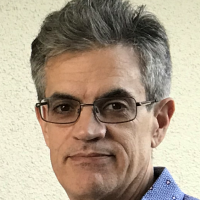Ian Feldman Interview Published on: 11, Apr 2024
 What inspired you to delve into the genre of apocalyptic fiction, and how do you approach crafting stories within this genre?
What inspired you to delve into the genre of apocalyptic fiction, and how do you approach crafting stories within this genre?
Over the last few years, we’ve seen greater conflict, increasing and larger natural disasters, unprecedented lawlessness, and more discord generally. Some people say we’re in the End Times. If you read the book of Revelation in the Bible, it’s easy to see why-disasters, conflict, and lawlessness feature prominently. This brought a question to mind. What would the end of the world look like? How would people know ‘it’s different this time’? While I’ve been writing for myself since I was little, this question gave me something to say that felt important enough to write books about.
John Steinbeck’s books have always resonated with me. My favorite is Of Mice and Men (OMAM). No matter how many times I’ve read it, I always choke up at the end. Remarkably, his stories feature issues with which we deal today—poverty, homelessness, and more. His characters don’t have super powers or mad skills. They’re ordinary people he brings to life with great skill. His stories use the events of his day as a backdrop not plot driver.
Most apocalyptic fiction uses some devastating event that changes life forever. No one ever sees it coming. The event lands and the characters deal with a world after the event. With the book of Revelation in mind, we all have an opportunity to know how the story plays out and prepare for the end in advance. Revelation, being the story of the end of the world, puts everything at risk. Every person, whether or not we are in the End Times, is in their own end times. What storyline could offer higher stakes? And, because the end is known in advance, characters and their choices really matter – enter Steinbeck.
My stories focus on the characters and the choices they make with the information available to them, just like everyone does. In Revelation, God wants people to choose Him of their own free will. In OMAM, why does George stay with Lenny? Anyone can see George would be better off without Lenny, yet George keeps Lenny around. This choice drives the story and keeps us reading to the end. Ordinary people faced with difficult choices. Art imitates life.
Your stories feature unique characters that challenge common thinking. How do you go about creating characters that stand out in the context of an apocalyptic setting?Storytelling tools tell us how to create good characters regardless of genre. The key to a good protagonist is a likable person who does the right thing. A good villain wants what everyone wants, but does it suboptimally. The first is the person we all want to be – heroic, likable, whatever. The second is the person we all want to avoid being – walking down a bad road based on a mistake in judgment. Both are very human and relatable. For apocalyptic stories, the characters captain their respective ships to the outcomes they choose. Some overcome their flaws and obstacles. Others are consumed by them. For me, the protagonist should be someone I aspire to be like.
In your End Times stories, contemporary issues are brought to light. Can you share an example of how you incorporate real-world challenges into your apocalyptic narratives?Lenny Smalls, the main protagonist of the End Is Here series, is a homeless military veteran. His daily struggles in The Vortex provide the lens through which we can view homelessness, the treatment of veterans, PTSD, and more. Life is hard. Some have it harder than others, even if it seems they have it all. It’s also biblical. God often chooses someone poor or flawed to do His work. Exploring these challenges brings the story to life. When the hero wins, we cheer. And villains? You don’t have to look to comic books for the worst villains. The worst villains are people just like us who believe they know better and act on it. It’s compelling, not cozy.
The apocalypse is a recurring theme in your work. What draws you to explore the impact of disasters on characters' lives, and how does it serve as a useful lens for storytelling?Putting ordinary people into extraordinary situations showcases their decisions. There are no do overs, no mulligans, no respawns. Unlike other genres, the characters don’t get to apologize tomorrow if they make a mistake. Often, they don’t get to survive. Having to make a right choice makes the story interesting. The motivation for the choice makes it compelling.
Your book, “The Vortex” is described as page-turning. How do you maintain a balance between keeping the readers on the edge of their seats and exploring deeper themes and issues?Page-turning fiction is created using a tool. Cue the suspenseful music. Da-da-daaaa. There’s a knock on the door. Tune in next time…
Everyone has experienced the tool. Executing it is different. As a story progresses and characters make choices, they often paint themselves into a corner. The trick is to assure that there are enough choices to keep readers guessing. For an author, the most fun is when a character tells you they would not do what you initially wrote. They would do something else. If the author is surprised, the reader will be.
Can you discuss the role of diversity in your stories, and how it adds to the richness of the challenges your characters face in apocalyptic scenarios?Want to write a boring story? Pick characters because they are physically different in some way and throw them together. Have the conflicts be about their physical differences.
Want to write an interesting story? Select characters who would naturally come together based on the plot and realistic group behaviors. Base the conflicts on the behaviors these characters would naturally exhibit. This diversity of thought allows for meaningful challenge and personal growth. Everyone is different and has a unique backstory. What the person brings to the story is much more important and interesting than genetically pre-determined physical characteristics.
Are there particular apocalyptic scenarios or disasters that you find most intriguing or challenging to write about? Why?Natural disasters are hard to write about. The formula requires a scientist or first responder who sees what others don’t see then gets to save the day. That isn’t real. Search the internet for disasters and people who prepare for them. There are millions. Who wants to read about the person who lives in a cabin in the woods prepared for the apocalypse? Nobody. What are the chances for someone to survive a real disaster? Near zero. Pick a disaster and read the headlines associated with it. Death toll is the usual statistic. People who survive are lucky. Turning that fact set into an interesting story is a real challenge.
Your characters seem to have a knack for challenging common thinking. How does this aspect of your storytelling reflect your own perspective on societal norms and expectations?While it’s what people want, happily ever after is not the norm. Most people will do tomorrow what they did today. Interesting characters don’t just lie down and take what comes. Hero or villain, they keep getting up to pursue their goal, good or bad. My experience has shown me that the people who succeed at something kept getting up after they’d been knocked down. Just showing up every day is half the battle.
My mother used to tell me to just keep on going. Turns out, it was the best advice she ever gave me. Don’t worry about what others think. Run your race. Don’t look left or right (this is biblical too). Focus on finishing what you started. This advice probably sounds similar to what most parents tell their kids, but not the same. My mom said it her way. As an author, I use genre as a guideline. I don’t see the point in writing what everyone else writes. I use my point of view to create the story. I write the characters warts and all in a judgment-free way. I let the reader judge them. Borrowing from Monty Python, “And now for something completely different…” Sort of.
How did you approach world-building in your apocalyptic fiction, “Fracture”?Having read Tolkien amongst other heavy world-building stories growing up, I always found world-building daunting. To be good, you have to get into the details. Fracture follows The Vortex and relies on present day southern California. Authors write what we know. Using the modern world saved me time in this first series. As I write backstory novellas and work toward the conclusion of the beginning of the apocalypse, the world-building becomes more complex because everything has to fit together for the world as I’ve modified it. I take a lot of time to be sure everything lines up.
Do you believe that apocalyptic fiction has a unique role in exploring and addressing contemporary societal issues?Apocalyptic fiction gives an author a real opportunity to make changes to the world and see what happens. There are fewer constraints as long as consistency is maintained. I think of it like the old Twilight Zone series. Lots of great stories come from putting a twist on something we take as a norm.
How do you tackle the creation of complex narratives with multiple characters in the midst of an apocalyptic setting?Weaving multiple characters together takes time. The reader has to meet each character and get updates on their progress even if not germane to the main story line. That’s the nature of character-driven fiction. The focus is on the relationships between people and their choices. Fewer characters would be easier. But, the apocalypse is a big stage that needs to be filled.
Your stories provide entertainment while exploring serious themes. How do you balance the need for escapism with the desire to shed light on important issues?Thrillers by their nature require someone to root for. The protagonist in the End Is Here series, Lenny Smalls, is that person. When he gets knocked down, we want to see how he gets up and overcomes. His journey has taken him down a different road based on choices most people wouldn’t make. This gives people an opportunity to walk a mile in someone else’s shoes without having to actually do it while rooting for the good guy. Sounds satisfying to me.
Are there specific contemporary issues that you find particularly urgent or challenging to incorporate into your fiction?There are so many. My goal is to show the impact of choices. So many people think they have the answer. Government is busy telling us what to do at a level of granularity that is scarier than anything I could dream up. People mostly go along with what they see and hear, especially when it comes to the internet. Fact check everything for yourself. Don’t take someone else’s word for it. Doesn’t matter which group you prefer, read the fine print. You’ll have to make choices about the issues sooner or later. It’s too late to complain when the outcome knocks on your door.
How do you ensure that your characters remain relatable to readers, even in the extreme circumstances of an apocalyptic world?By starting with a focus on character, I believe readers will find the characters relatable throughout the series. No one has super powers or has to believe in something farfetched to understand what the characters do. No matter what the challenge, everything is personal.
When did you join AllAuthor and would you say that this website has been helpful?I joined AllAuthor so I could vote for another author’s book cover in the monthly cover contest. Once I saw what AllAuthor offered, I joined ‘for real’ in October, 2023 when I put the original Vortex cover in the monthly contest. AllAuthor has given me a place to link people to my work and allows me to find other authors and genre information to keep up with what’s going on in the market. I’ve used the GIF feature to create a trailer I posted on Facebook and my website. It’s a great tool and most of it is free! AllAuthor is definitely something I would recommend to other independent authors.
Ian D. Feldman is a captivating author renowned for his gripping apocalyptic fiction. His novels are filled with compelling characters who defy conventional norms and illuminate modern-day concerns. With each page-turning story, Feldman masterfully intertwines entertainment with insightful commentary on the human condition.
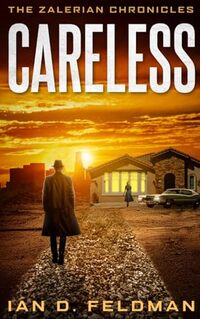 Careless: A John Zalerian Novel (Book 2) Detective Thriller (The End Is Here 5)
Genre: Crime Fiction, Thriller, Science Fiction
Careless: A John Zalerian Novel (Book 2) Detective Thriller (The End Is Here 5)
Genre: Crime Fiction, Thriller, Science Fiction
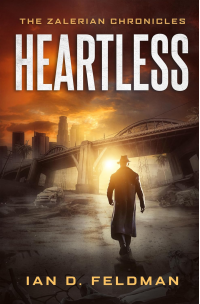 Heartless: A John Zalerian Novel (Book 1) Detective Thriller (The End Is Here 4)
Genre: Crime Fiction, Thriller, Science Fiction
Heartless: A John Zalerian Novel (Book 1) Detective Thriller (The End Is Here 4)
Genre: Crime Fiction, Thriller, Science Fiction
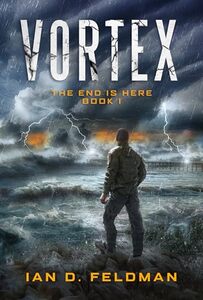 The Vortex (The End Is Here Book 1)
Genre: Supernatural Suspense, Christian Fiction, Science Fiction
The Vortex (The End Is Here Book 1)
Genre: Supernatural Suspense, Christian Fiction, Science Fiction
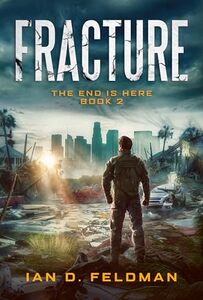 Fracture: An Apocalyptic Thriller (The End Is Here Book 2)
Genre: Suspense, Supernatural Suspense, Christian Fiction
Fracture: An Apocalyptic Thriller (The End Is Here Book 2)
Genre: Suspense, Supernatural Suspense, Christian Fiction
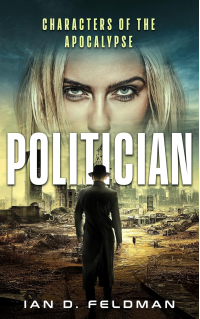 Politician: An Apocalyptic Psychological Crime Thriller (The End Is Here)
Genre: Crime Fiction, Mystery, Science Fiction
Politician: An Apocalyptic Psychological Crime Thriller (The End Is Here)
Genre: Crime Fiction, Mystery, Science Fiction
